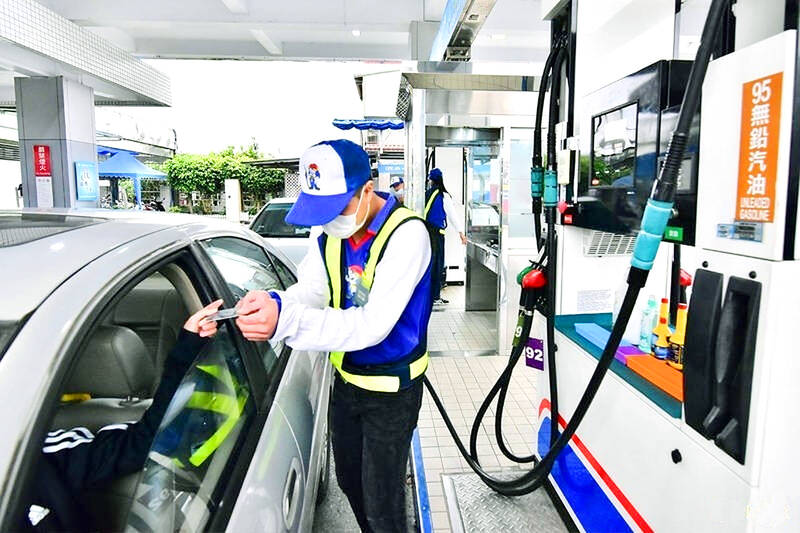State-run oil refiner CPC Corp, Taiwan (CPC, 台灣中油) yesterday said that it would leave its gasoline and diesel prices unchanged this week, despite a spike in international crude prices this week.
CPC said the decision not to increase fuel prices based on market trends was made in line with government policy to keep domestic fuel prices and consumer prices stable during the Lunar New Year holiday, which ends on Sunday.
Prices at CPC gas stations are to remain unchanged at NT$27.8 per liter for super diesel, NT$29.1 per liter for 92-octane unleaded gasoline, NT$30.6 per liter for 95-octane unleaded gasoline and NT$32.6 per liter for 98-octane unleaded gasoline, the company said.

Photo: Chung Li-hua, Taipei Times
On Friday, international crude oil prices closed at their highest levels since the middle of November last year amid rising optimism over demand from China after Beijing eased its COVID-19 restrictions.
West Texas Intermediate for March delivery on Friday climbed US$1.03 from a day earlier to US$81.64 in New York.
Brent for March delivery rose US$1.47 to US$87.63 per barrel in London.
CPC calculates its weekly fuel prices based on a weighted oil price formula made up of 70 percent Dubai crude and 30 percent Brent crude.
Based on the mechanism, gasoline and diesel prices should have increased 4.18 percent, CPC said.
As CPC keeps fuel prices unchanged until Sunday, it would absorb additional costs of NT$1.2 per liter for gasoline and NT$1.4 per liter for diesel during the period.
The government requires CPC to keep gasoline and natural gas prices in Taiwan lower than those in neighboring economies such as Japan, South Korea, Hong Kong and Singapore.

Tropical Storm Gaemi strengthened into a typhoon at 2pm yesterday, and could make landfall in Yilan County tomorrow, the Central Weather Administration (CWA) said yesterday. The agency was scheduled to issue a sea warning at 11:30pm yesterday, and could issue a land warning later today. Gaemi was moving north-northwest at 4kph, carrying maximum sustained winds near its center of up to 118.8kph and gusts of 154.8kph. The circumference is forecast to reach eastern Taiwan tomorrow morning, with the center making landfall in Yilan County later that night before departing from the north coast, CWA weather forecaster Kuan Shin-ping (官欣平) said yesterday. Uncertainty remains and

SEA WARNING LIKELY: The storm, named Gaemi, could become a moderate typhoon on Wednesday or Thursday, with the Taipei City Government preparing for flooding A tropical depression east of the Philippines developed into a tropical storm named Gaemi at 2pm yesterday, and was moving toward eastern Taiwan, the Central Weather Administration (CWA) said. Gaemi could begin to affect Taiwan proper on Tuesday, lasting until Friday, and could develop into a moderate typhoon on Wednesday or Thursday, it said. A sea warning for Gaemi could be issued as early as Tuesday morning, it added. Gaemi, the third tropical storm in the Pacific Ocean this typhoon season, is projected to begin moving northwest today, and be closest to Taiwan on Wednesday or Thursday, the agency said. Today, there would likely

DISRUPTIONS: The high-speed rail is to operate as normal, while several airlines either canceled flights or announced early departures or late arrivals Schools and offices in 15 cities and counties are to be closed today due to Typhoon Gaemi, local governments announced last night. The 15 are: Taipei, New Taipei City, Taoyuan, Tainan, Keelung, Hsinchu and Kaohsiung, as well as Yilan, Hualien, Hsinchu, Miaoli, Chiayi, Pingtung, Penghu and Lienchiang counties. People should brace for torrential rainfall brought by the storm, with its center forecast to make landfall on the east coast between tonight and tomorrow morning, the Central Weather Administration (CWA) said. The agency issued a sea warning for the typhoon at 11:30pm on Monday, followed by a land warning at 11:30am yesterday. As of

CASUALTY: A 70-year-old woman was killed by a falling tree in Kaohsiung as the premier warned all government agencies to remain on high alert for the next 24 hours Schools and offices nationwide are to be closed for a second day today as Typhoon Gaemi crosses over the nation, bringing torrential rain and whipping winds. Gaemi was forecast to make landfall late last night. From Tuesday night, its outer band brought substantial rainfall and strong winds to the nation. As of 6:15pm last night, the typhoon’s center was 20km southeast of Hualien County, Central Weather Administration (CWA) data showed. It was moving at 19kph and had a radius of 250km. As of 3pm yesterday, one woman had died, while 58 people were injured, the Central Emergency Operation Center said. The 70-year-old